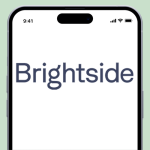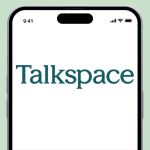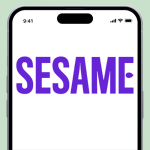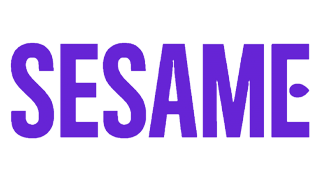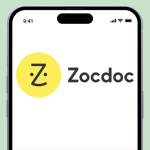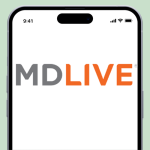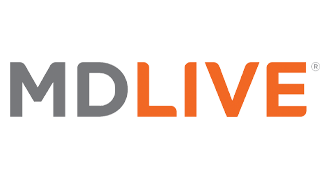Table of Contents
- We spent more than 10,000 hours researching over 70 online therapy and psychiatry platforms, and our testers signed up for the 20 most popular platforms—including 15 offering psychiatry—to bring you our top picks.
- Our testers use each platform for two to four weeks, focusing on the sign-up process, provider selection, provider session quality, and customer service interactions.
- We surveyed over 1,000 online psychiatry users, held focus group interviews with real users, and consulted over 60 mental health experts.
- We score each platform according to affordability, data privacy, availability, and inclusivity.
- Our pages are updated regularly to update pricing and service information and to reflect our ongoing testing of new online psychiatry platforms.
Learn more about how we tested online psychiatry platforms.
Key takeaways
- Brightside is our pick for the best online psychiatry platform because it offers treatment plans for both psychiatry and therapy and includes bonus benefits like self-paced lessons.
- Among the online psychiatry platforms we tested, the average cost of an initial session was $306, without insurance, but subsequent sessions are typically more affordable.
- Through surveys, focus groups, and testing, we determined important factors to consider when choosing an online psychiatry platform, including affordability, availability, inclusivity, and data privacy.
- Online psychiatrists can diagnose conditions and prescribe medications, but not all platforms can prescribe controlled substances, like some of those used to treat ADHD and anxiety.
Making time in your schedule to prioritize mental health can be challenging. Virtual psychiatry, also known as telepsychiatry, allows you to connect with a clinician without the commute, which can be a big advantage if you’re on a tight schedule, have limited mobility, or live in an area with few providers.
Psychiatry providers are board-certified, licensed physicians or psychiatric nurse practitioners who offer different mental health care than therapists. Psychiatrists can prescribe psychiatric medications in addition to providing psychotherapy (also known as talk therapy), although not many psychiatrists provide the latter. By contrast, the best online therapy services cannot prescribe medications without a psychiatric provider’s guidance.
We researched more than 70 online mental health platforms and identified the ones that offer psychiatric care, specialized psychiatric care, and extra features that help support mental wellness, like self-paced lessons between appointments. We then test each platform to identify the best picks for our readers. We prioritize platforms that offer transparency in cost and appointment availability. We also find out which medications each platform can prescribe, which ones they can’t, and how to fill a prescription if it’s part of your treatment plan. Additionally, we highlight which states the platforms currently operate in, where there are specific laws or regulations around online prescriptions, and when in-person psychiatry may be a better choice.
Here are our Handbook Team’s findings for the top five online psychiatry platforms, and some additional options worth considering.
Our picks for the best online psychiatrist platforms
- Brightside: Best overall
- Talkspace: Best for using insurance
- Sesame: Best for same-day appointments
- Zocdoc: Best provider search tool
- MDLive: Best for adolescents
What we look for in online psychiatry platforms
- Areas of expertise: Some psychiatrists specialize in the treatment of specific mental health conditions, such as ADHD, which can be helpful for those who prefer someone with direct experience.
- Medication management: Online psychiatrists can prescribe medications after making a diagnosis. But providers on online psychiatry platforms may not be able to prescribe all types of medications, such as controlled substances including Ritalin and Xanax.
- Affordability: Pricing and insurance coverage vary from platform to platform. You can typically expect to pay more for an initial consultation and a lower per-session rate after that.
Brightside: Best online psychiatrist platform overall
Why Brightside is our pick for best overall
Brightside Health is a comprehensive mental health care platform offering online psychiatry and therapy sessions. After comparing it to other online psychiatry options, we found Brightside to be the best overall option. Not only does Brightside offer both therapy and psychiatry, it also includes valuable extra services and features. All Brightside users can access an easy-to-use app with features like self-paced lessons on mental health topics, a symptom tracker, and a messaging system to keep in touch with your provider between sessions.
We also like that the Brightside psychiatry plan is more affordable than other online psychiatry platforms. It starts at $95 per month for those paying out of pocket. Finally, we like that Brightside accepts insurance (including Medicare Part B, some Medicare Advantage plans, and certain Medicaid plans), which can help make psychiatric care more affordable.
Brightside clinicians can prescribe certain common antidepressant and anxiety medications, including selective serotonin reuptake inhibitors (SSRIs) and serotonin and norepinephrine reuptake inhibitors (SNRIs). Brightside lists all of the medications its clinicians can prescribe on their website.
Providers on Brightside cannot prescribe controlled substances, including benzodiazepines for anxiety, like Xanax, Klonopin, and Ativan, or stimulants for ADHD, like Adderall or Ritalin. If it is determined that these types of medications should be part of your treatment, it may be best to see a psychiatrist in person for an evaluation, especially because some of these drugs require lab work and ongoing monitoring.
Who may want to use Brightside: Brightside is a good option for people seeking a combination of psychiatry and talk therapy, especially if they want to use insurance to pay. For people paying out of pocket for psychiatry alone, Brightside is the most affordable platform we tested.
Who may not want to use Brightside: If you’re specifically seeking a prescription for a controlled substance like Xanax, Klonopin, or Ativan, Brightside can’t help you. Brightside providers cannot legally prescribe these medications.
Brightside tester insights
Brightside stands out as one of the few online psychiatry platforms that offers additional helpful features and learning resources.
Brightside users have access to self-guided mental health resources called Self-Care Lessons, which are based on the Unified Protocol, an approach that has been shown in studies to be effective for a wide range of mental health concerns, including agoraphobia, generalized anxiety disorder, and obsessive-compulsive disorder (OCD). Additionally, Brightside shares helpful data and research around its methodology and results.
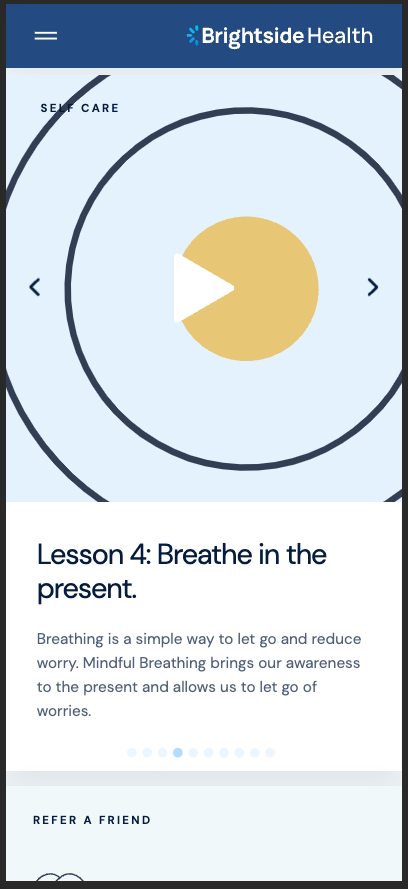
Our testers say good things about the Brightside app, including how easy it is to manage appointments and see their progress. Brightside’s symptom tracker assesses users’ anxiety and depression symptoms every two weeks, a helpful tool for tracking long-term progress. The app also includes self-guided lessons like breathing exercises, which our testers found helpful. You can use the website for guided lessons as well, but some testers say the desktop version is less visually appealing and not as easy to navigate as the app.
From one of our Brightside testers:
“The lesson started with a video with a voiceover that commends the client for seeking out help and taking the first step toward addressing depression and anxiety. The language was validating, friendly, and encouraging.”
We like that the platform integrates therapy and psychiatry in its approach to mental health care. Brightside’s Psychiatry + Therapy plan gives you four monthly sessions with a licensed therapist in addition to your initial psychiatric video evaluation and ongoing care. What ongoing care means is specific to each individual and their situation.Your care team will tailor a treatment plan personalized to your needs—including prescription medication if necessary. After that you get regular one-on-one check-ins with your care team (including weekly therapy), anytime messaging support via the portal and app, interactive lessons and proactive progress tracking. So if you message your care team saying you don’t think your medication is working, for example, they’ll schedule a check-in appointment to talk about that with the prescribing member of your care team.
We also like that Brightside offers multiple ways for patients to connect with their providers and work on their mental health goals. Testers appreciate that there are notes about their care in their file on the platform so their therapist and psychiatrist are always up to date on anything they’ve shared in sessions and they don’t have to repeat themselves to the other provider.
You can use the Brightside platform to message your therapist or psychiatric clinician between sessions to discuss your prescription or schedule follow-up visits. You can also use the app to take bi-weekly assessments that show your progress as a visual chart.
Our tester finds the messaging feature easy to use. They say that switching between their providers is seamless and they are able to share their chats with each provider, a plus for coordinating care between your psychiatrist and therapist.
What other Brightside users say
The majority of users choose Brightside for its psychiatry services. In our February 2024 survey of Brightside users, 53 percent said they were subscribed to the platform’s psychiatry services. Users preferred the psychiatry plus therapy plan, but some also noted just participating in psychiatry or using the psychiatry and Crisis Care programs together.
In our June 2024 survey of 600 online psychiatry users, 81 percent of respondents who used Brightside tried in-person psychiatry first, and 48 percent chose virtual psychiatry because they didn’t want to commute to in-person sessions. Additional reasons for choosing virtual psychiatry included: Not finding in-person providers within a reasonable distance or ones that were accepting new patients, not having the time to make a commute work in their schedules, not having childcare, or not being physically able to attend in-person sessions due to a physical health condition or disability.
To learn more, read our Brightside review.
Talkspace: Best online psychiatrist platform for using insurance
Why Talkspace is our pick for best for using insurance
Talkspace’s pay-per-session online psychiatry sessions and in-network providers can make psychiatric care more affordable. Talkspace providers are in-network with major insurance plans like Cigna, Optum, and Aetna, and the platform allows you to check your coverage without signing up for an account. We recommend calling your insurance company separately to check your coverage for online psychiatry through Talkspace, even if you’re already using your insurance for Talkspace’s online therapy, as insurance plans sometimes cover teletherapy and telepsychiatry providers differently.
Talkspace clinicians can prescribe common SSRI and SNRI medications, as well as drugs like Wellbutrin, Buspar, Trazodone, Abilify, Strattera, and “any medication that is not a controlled substance and is deemed medically appropriate by your Talkspace provider,” according to their website.
While Talkspace states that it can support individuals with ADHD, Talkspace psychiatry providers do not prescribe controlled substances, such as stimulant medications (e.g. Adderall, Ritalin, Concerta, Vyvanse). Stimulant medications are often used in treatment for ADHD, so know that Talkspace psychiatry may not be able to offer you all the medication options for your condition.
Who may want to use Talkspace: If you need to find an in-network provider to afford psychiatric care, you may want to try Talkspace. Their pay-per-session model means you’re not locked into a monthly fee, and you’ll only be responsible for the cost of your insurance copay per visit.
Who may not want to use Talkspace: If you’re paying out of pocket, more affordable online psychiatric providers, like Brightside, are available. If you’re paying with insurance but have Medicare or Medicaid, you may also want to try Brightside. Like Brightside, Talkspace providers do not prescribe controlled substances such as Xanax, Klonopin, or Ativan.
Talkspace tester insights
Similar to Brightside, Talkspace offers both online psychiatry and online therapy. One key difference we like about Talkspace is that online psychiatry sessions can be booked as needed rather than bundled into a monthly subscription. That means that in this program, you’re not required to do a follow-up appointment if you don’t need one, but you are able to book one if you do. This can be helpful because the frequency of follow-up psychiatry appointments can vary depending on the type of treatment you’re prescribed, the stability of your symptoms, how well you progress, and other factors going on in your life.
Our testers like that Talkspace frequently checks in with users to ask how things are going with their providers. First, patients are asked to rate their provider out of five stars and then indicate what’s going well, with options like responsiveness, insightfulness, and focus on goals.
Testers also like Talkspace’s bonus features, especially the therapist-led workshops and mental health exercises included in the app. Topics include sensory awareness, overcoming worry, and focusing on a single task. Each exercise is five minutes or less. Our testers appreciate these bite-sized strategies for improving mental health.
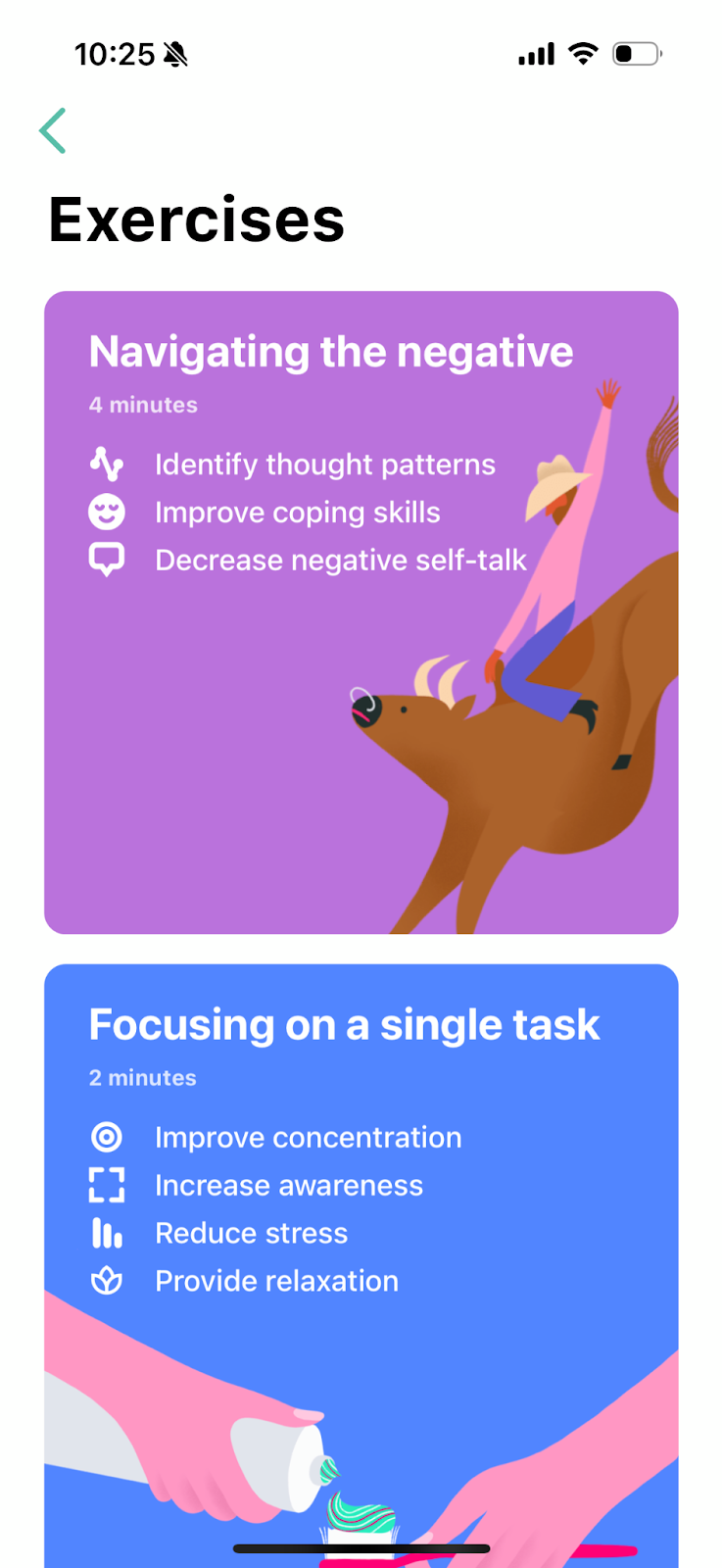
Like Brightside, Talkspace users can message their providers through the platform at any time. The Talkspace platform provides a private chat room with your psychiatric provider. But unlike Brightside, your chat with your psychiatrist cannot be shared with your Talkspace therapist, if you also see one.
What other Talkspace users say
In our June 2024 survey of 600 people who use online psychiatry platforms, 68 percent of Talkspace users were seeking treatment for anxiety, and 50 percent were seeking treatment for depression. Talkspace users also sought treatment for ADHD, bipolar disorder, panic disorders, and social anxiety. 83 percent of Talkspace users agree or strongly agree that they were adequately informed by their physiatrist regarding the potential side effects and transition process associated with their medication.
Our survey also shows that 36 percent of Talkspace users chose the platform because it accepts their insurance plan, and 28 percent chose the platform because it also offers therapy.
To learn more, read our Talkspace review.
Sesame: Best online psychiatrist platform for same-day appointments
Why Sesame is our pick for best for same-day appointments
Researchers have found the median wait time for an online psychiatry appointment is 43 days (for in-person appointments, the wait time is even longer—67 days). Sesame has a simple provider search that shows providers’ earliest availability, and when we tested the platform, it had same-day appointments with psychiatric providers in our state. This is rare among online psychiatry providers.
Who may want to use Sesame: If you don’t have insurance and hope to find psychiatric care quickly, Sesame might be a good fit. You can search for same-day appointments according to your location and budget, as all per-session fees are clearly listed.
Who may not want to use Sesame: If you want to pay with insurance, try online therapy covered by insurance, like Brightside or Talkspace. Also, Sesame providers do not prescribe controlled substances like Xanax or Ativan, so they won’t be a good fit if you need these types of medications.
Sesame tester insights
Sesame Care has an easy-to-use platform for booking psychiatry sessions. You can quickly browse provider profiles, see their availability, and compare visit fees. Provider availability varies by location, but some have same-day and next-day appointments. Sesame doesn’t take insurance, but it does offer the option for medication delivery, and many common psychiatric medications are on its “$5 meds” list, meaning you can get the generic versions of certain prescriptions for as little as $5 for a one month supply.
In January 2024, we searched for online psychiatry appointments in Texas, the state with the worst access to mental health care, according to Mental Health America. We were happy to find that out of 38 Sesame providers in Texas, more than half (53 percent) had same-day availability. We found only one available psychiatry provider in Alabama, a state with the second poorest access to mental health care. The provider did have an appointment within 48 hours of our search, but we would have liked to see more choices. We also found the cost per session across the country can vary greatly by provider and location. We saw a wide range of costs for online psychiatry visits—from $42–$385.
It’s also important to know that many “online psychiatrist” searches on Sesame will include psychiatric mental health nurse practitioners (PMHNP). Like psychiatrists, PMNHPs can assess, diagnose, and treat behavioral and mental health conditions. They can also prescribe medications. The key difference between the two providers is the level of education and experience. Psychiatrists are medical doctors who have been through medical school and residency, while PMNHPs are advanced practice registered nurses (APRNs) with a master of science in nursing (MSN) degree and several years of nursing experience.
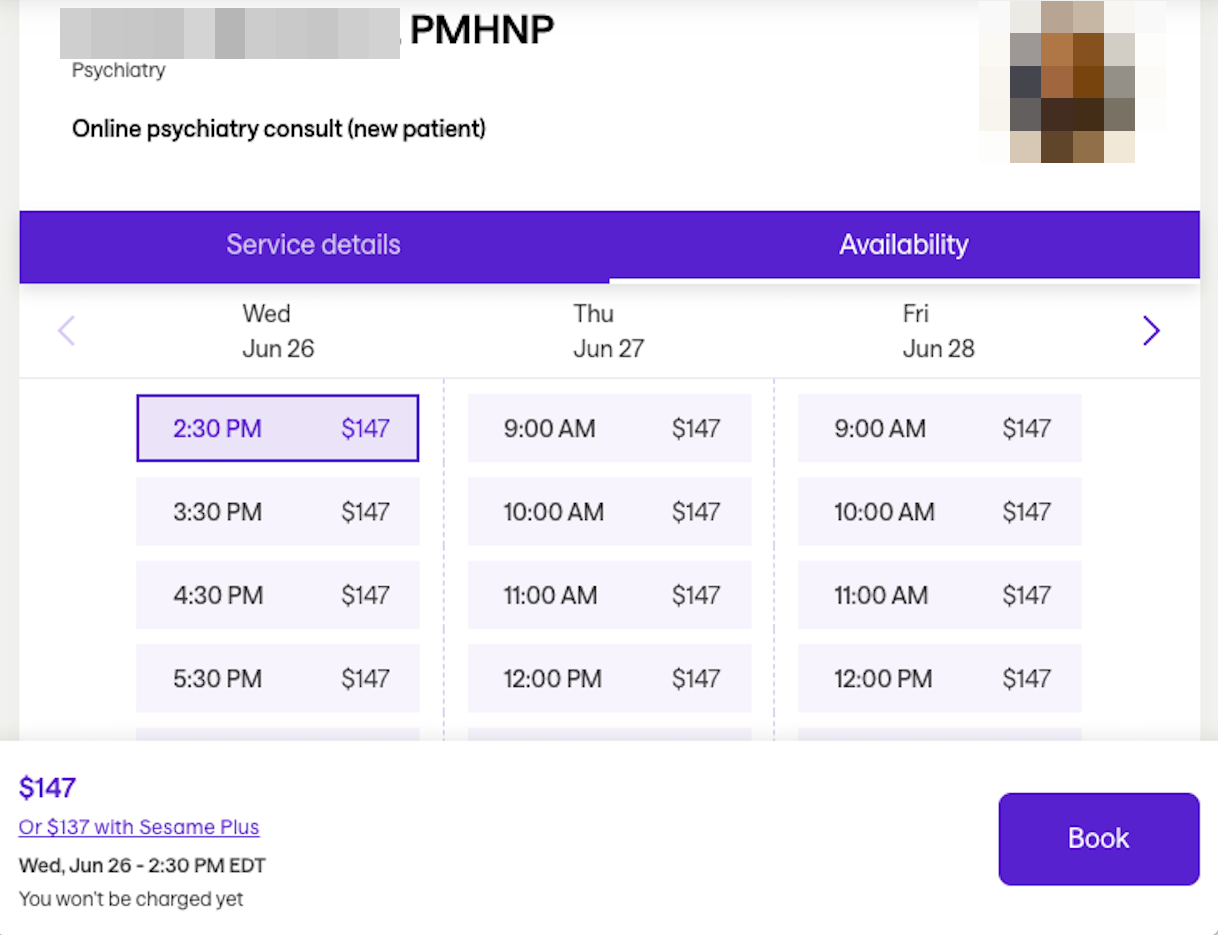
We like that Sesame is also a good option for affordable medication management. Sesame providers can send prescriptions through SesameRx, the platform’s medication delivery service. We learned that SesameRx provides certain generic medications for $5 for a 30-day supply (plus a $5.99 shipping and processing fee). Users may find their medication is more affordable through Sesame than through insurance copays. Online psychiatry providers on Sesame do not prescribe controlled substances or opioid pain medications.
From one of our Sesame testers:
“I made this appointment on the same day. I wanted to test if the doctor would be late or a no-show, as that’s been a complaint with some online psychiatry providers. But that didn’t happen!”
What other Sesame users say
From our February 2024 survey of 100 Sesame users, 77 percent of respondents gave the platform an overall 8/10 or higher, and 83 percent agreed that Sesame was a good value for the money they spent.
To learn more, read our Sesame review.
Zocdoc: Best online psychiatrist provider search tool
Why Zocdoc is our pick for best provider search tool
Of all the sites we reviewed for psychiatry online, Zocdoc is the best for searching for providers that meet specific criteria. You can refine your search for an online psychiatry consultation with more than a dozen filters, including availability, provider identity, languages spoken, and treatment specialties.
Who may want to use Zocdoc: If you need to find an online psychiatry provider who meets specific criteria—like taking your insurance or specializing in a particular type of care—Zocdoc is a good place to start looking. This platform is also great for people seeking a “one-stop shop” for several medical needs, as you can also find primary care physicians, dermatologists, and more.
Who may not want to use Zocdoc: People looking for a single platform to find and connect with a provider. Zocdoc is a directory tool that connects you to a provider or provider’s office, adding an extra layer of communication (such as emailing the provider or signing up for their scheduling platform). But if a highly streamlined onboarding process is important to you, consider Sesame, which allows you to choose your provider and log in for your appointments on the same platform.
Zocdoc tester insights
Zocdoc is a provider directory that helps you find a medical provider to suit your specific needs. You can filter virtual psychiatry providers by insurance plan, patient age, gender identity, faith, types of care provided, and more. Unlike platforms that do the matching for you, you can choose your provider on Zocdoc based on the information in their profiles, where you can see their biographies, qualifications, patient reviews, and availability.
Once you are connected with a provider, they will share how they host their virtual sessions. Our testers were provided a secure link to join their sessions, but some providers may ask you to download a third-party app where they conduct appointments.
Like Sesame, we also found some providers on Zocdoc offering same-day virtual psychiatry appointments. But compared to Sesame, we found there were typically more providers available on Zocdoc in general.
Additionally, you can filter providers by their treatment specialties. For example, we were able to find providers specializing in conditions including depression, anxiety, obsessive compulsive disorder (OCD), and post-traumatic stress disorder (PTSD).
Finally, the provider profiles on Zocdoc make it easy for users to see patient reviews, which is helpful if you want to know how the provider delivers care. Ratings are divided into overall rating, wait time, and bedside manner, and patients can include comments about their experience.
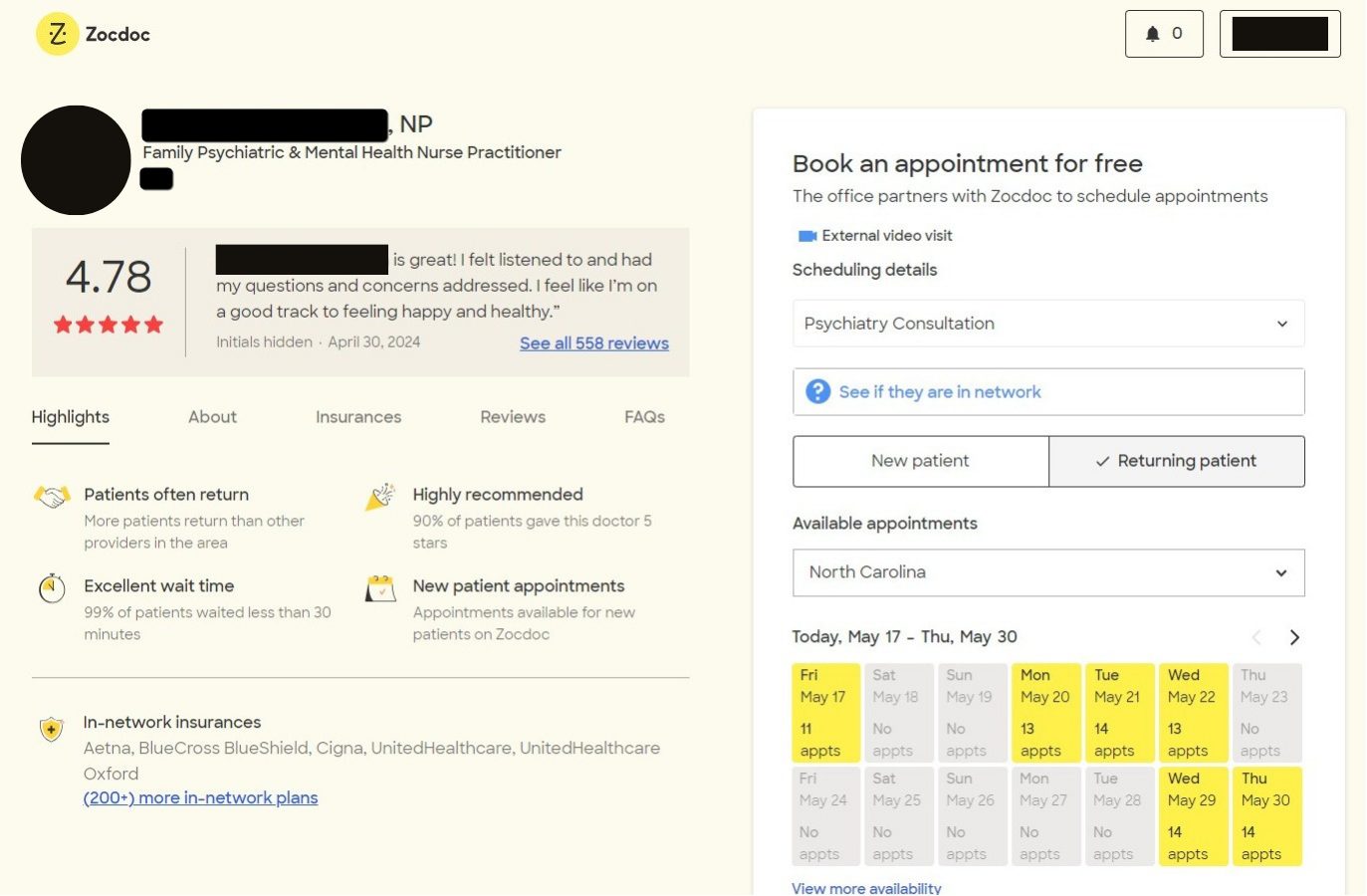
From one of our Zocdoc testers:
“My psychiatrist got to know me, what my concerns were, my history, and the medications I had taken in the past. He asked a lot of questions to determine the best course of treatment. He started me on a few medications with the caveat that they may not be the best fit for me, so we met up a month later to determine next steps.”
Unlike the other platforms in this review, Zocdoc does not have limitations on prescribing controlled substances. This is because Zocdoc is a directory, not a host for providers, so virtual sessions do not take place through the Zocdoc platform, but rather through the provider’s. The ability to virtually subscribe controlled substances will vary according to your chosen provider and the laws and regulations in your state.
What other Zocdoc users say
In our February 2024 survey of 100 Zocdoc users, 88 percent of respondents gave Zocdoc an 8/10 or higher when asked about overall satisfaction with the platform, and 94 percent say they had positive interactions with their provider. Most Zocdoc users—87 percent—used insurance to pay for their virtual sessions.
For more insights, read our Zocdoc review.
MDLIVE: Best online psychiatrist platform for adolescents
Why MDLIVE is our pick for best for adolescents
MDLIVE stands out for offering treatment for children aged 10 and older. Parents looking for mental health care for their pre-teen or teen (10–17 years old) can create a profile on the platform and book an appointment with a child and adolescent psychiatry (CAP) specialist.
According to the American Academy of Child and Adolescent Psychiatry, CAPs specialize in diagnosing and treating disorders that affect children, adolescents, and their families. CAPs can diagnose and treat ADHD, but MDLIVE providers do not prescribe controlled substances, including stimulant medications for the treatment of ADHD or certain medications for the treatment of anxiety, like benzodiazepines.
Who may want to use MDLIVE: People seeking psychiatric care for their teen or pre-teen may want to seek care from a CAP on MDLIVE. This may also be a good option for people who are seeking comprehensive care in one virtual location, as MDLIVE also offers urgent and primary care.
Who should not use MDLIVE: MDLIVE does not provide care for adolescents with moderate to severe autism spectrum disorder (ASD), active psychosis, or who are struggling with substance use. Also, if you don’t have insurance, MDLIVE psychiatry fees may be more expensive than other options, like Brightside.
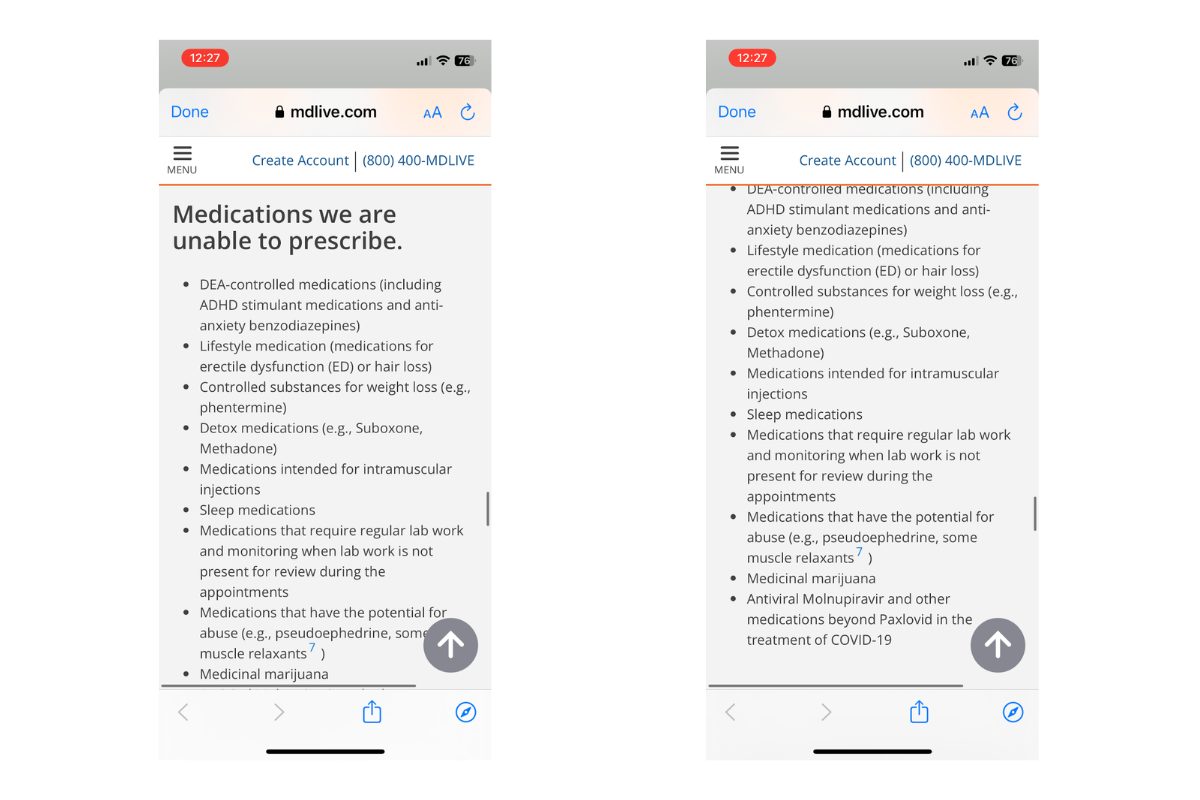
MDLIVE tester insights
MDLIVE is a no-frills telehealth platform that offers online urgent care, primary care, and mental health care. Parents can book online psychiatry appointments for adolescents 10 and older. Child and adolescent psychiatrists (CAP) are available on the platform, and we even found providers with same-day availability.
Our testers found it easy to book an online psychiatry visit on MDLIVE. We found providers who were available after work hours and some who were ready to meet the same day. Although out-of-pocket costs per online psychiatry session can be higher than average on MDLIVE, your visit may be more affordable if you use insurance coverage. However, you’ll need to sign up for an account and enter your insurance information to determine whether your MDLIVE psychiatry visits will be covered by insurance. We prefer the approach taken by Talkspace, which lets you know if you’ll be covered before you create an account.
MDLIVE is a telehealth platform with providers that cover a range of health needs; it doesn’t specialize in supporting just mental health. Although we find the platform easy to navigate and sign up for, it doesn’t have extra features or resources to support mental wellness.
Our testers like that the virtual sessions take place through the MDLIVE platform rather than through a provider’s platform, which often requires the use of third-party sites like Zoom, FaceTime, or Google Meet (as is the case with Zocdoc). Testers also like the after session follow-up, which includes an email summary of the visit and a detailed follow-up plan.
What other MDLIVE users say
In our June 2024 survey of 600 online psychiatry users, 58% of respondents who used MDLIVE said that they were either very satisfied or somewhat satisfied with their psychiatrist’s availability on the platform. 68% of respondents said that they were either very satisfied or somewhat satisfied with the technology used for their online psychiatry appointments on the platform.
To learn more, read our MDLIVE Review.
Other brands to consider
Talkiatry offers psychiatric treatment for adults and children as young as six years old. While psychiatry is their primary service, you can be referred to a Talkiatry therapist if you are already seeing a psychiatrist on the platform.
The providers on Talkiatry treat a wide range of conditions, including ADHD, anxiety, bipolar disorder, and obsessive-compulsive disorder. Unlike many of the other online psychiatry platforms we recommend, Talkiatry providers can prescribe controlled substances if appropriate for your treatment plan, and depending on the laws in your state.
The platform didn’t make our “best” list because Talkiatry only offers care for those with in-network insurance, so you must have insurance to use the platform. They do accept over sixty plans, including BlueCross BlueShield, Cigna, Optum, United Healthcare, and more.
From a Talkiatry user:
“I would recommend Talkiatry to anyone who needs to see a psychiatrist. It’s very easy to set up your account and I haven’t had any issues with any of the psychiatrists I’ve had.”
Online psychiatry platforms to avoid
Hims is a telehealth service for men’s wellness, best known for prescribing treatment options for hair loss and erectile dysfunction. Our ongoing testing of Hims for psychiatric medications revealed that Hims may make it too easy to access medications without proper guidance from a medical professional.
Our Hims testers found they could get medications shipped to them without meeting with an online psychiatrist, and one of our testers, who has a Wisconsin ID, was able to order a medication delivery to North Carolina. Also, one of our testers indicated in the Hims survey that they drink heavily, but they were still able to order a prescription drug that should not be taken with alcohol.
Because of the level of risk with unsupervised psychiatric medications and the apparent lack of caution in their prescription practices, Hims for online psychiatry may not be a safe choice.
From our Hims tester:
“I submitted my forms and got a message two minutes later saying my prescription was approved. They did give me the name of my provider, but I find it hard to believe a provider was able to review and approve within two minutes.”
Data privacy on mental health platforms
Conversations between you and your mental health care provider can be very personal and sensitive. In our October 2023 survey of online mental health users, about three in four (77 percent) of respondents said that the digital privacy of an online platform was extremely or very important to them. Online therapy and psychiatry platforms have a responsibility to safeguard their users’ data by protecting personal health information (PHI) under HIPPA and adhering to the Health Information Technology for Economic and Clinical Health (HITECH) Act.
In addition to understanding how your data is collected and used before you sign up for online health services, we recommend the following basic steps we learned from the U.S. Department of Health and Human Services (HSS) and the Mozilla Foundation *Privacy Not Included project:
- Attend your online therapy appointment in a private location, preferably not on a public Wi-Fi network.
- Use your personal computer when possible.
- Look for checkboxes during sign-up to opt out of data tracking or medical information disclosure.
- Sign up with your personal email address, not a social media login like Facebook.
- Choose a strong password to create a secure account login.
- Before choosing a provider, review each platform’s privacy guidelines to understand whether they share private information.
How we test and choose the best online psychiatry platforms
The Handbook Team continually works to research online therapy and psychiatry platforms. So far, we’ve put in over 10,000 hours of research, testing, and evaluation to review different online therapy and psychiatry platforms, down to the fine print. We researched 70 online therapy and psychiatry platforms, directories, and networks, and signed up for the top 20 mental health platforms to test them out for ourselves.






Firsthand testing experience
Testers explore the platforms and fill out the intake assessments to learn what questions the platforms ask, how many questions they ask, and how quickly they are matched with psychiatry providers. Testers then review the list of providers available to see how many choices they have and what information they can see about the providers. We also ask testers to evaluate the available appointment times to see how quickly they can be seen and how many choices they have.
For each platform, we document which medications they can prescribe and how users can fill their prescriptions. Testers also reach out to customer service with specific questions to gauge how quickly and thoroughly they respond to requests, and they evaluate any additional features the platforms offer, like journals and worksheets. Testers log their experience in a diary and come together to share their findings when testing concludes.
Online psychiatry surveys
We received survey responses from over 2,000 online therapy and psychiatry users in varying age groups. These surveys asked current users of 10 of the most popular online therapy and online psychiatry platforms to evaluate each service. Their feedback taught us firsthand how users leverage each platform’s unique features and helped us learn how users feel about important issues like data privacy. We also surveyed 600 online psychiatry users to better understand their reasons for seeking this service virtually and their experiences with specific providers.
Our online therapy and psychiatry rating indexes
We created a unique rating index to see how varying platforms measure up to four key factors:
- Affordability: In our ongoing testing, we look for affordable online therapy and psychiatry platforms with reasonable out-of-pocket prices. We also include services that accept insurance or offer financial aid.
- Data privacy: We examine how each platform collects and handles user data. If a brand doesn’t have this info available on their website, we reach out to ask them directly.
- Provider availability: We collect data on a brand’s total number of in-network providers and their appointment availability in different states.
- Inclusivity: We evaluate platforms on their inclusivity and diversity of practitioners. We also note if a platform allows you to filter providers by ethnicity or gender identity.
Mental health experts
Our Handbook Team works with more than 60 mental health experts for their guidance and input. For online psychiatry specifically, we interview psychiatrists who provide virtual psychiatry to learn more about their experiences. (Note: These providers offer telehealth sessions through their private practice, they are not clinicians on online platforms.)
We ask for details on when online mental health care can be beneficial and when it is not appropriate. For example, we learned that in the case of someone living with agoraphobia, in-person sessions are more effective for the individual’s progress compared to avoiding exposure therapy by exclusively attending online appointments. We also learned that for certain conditions, a prescription for a controlled substance is considered a first-line treatment. For example, stimulants like Adderall or Ritalin are often prescribed to help manage ADHD. However, these are controlled substances, and not all online psychiatry platforms are legally allowed to prescribe them.
Learn more about our online therapy and psychiatry testing and review methodology.
Our online psychiatry testing process
HelpGuide Handbook for Our Online Psychiatry Testing Process
- Fill out the intake assessment.
- Subscribe as a new user.
- Review provider match options.
- Evaluate appointment availability.
- Research types of medications platform can prescribe.
- Explore platform features like journals, worksheets, and symptom trackers.
- Contact customer service with questions.
In a mental health emergency:
Online psychiatrists may not be the most appropriate resource to help in a mental health crisis. If you or someone you know is a danger to themselves or others, it’s an emergency that can’t wait for an online psychiatrist’s response.
Don’t wait. You can find help immediately by:
- Calling 911.
- Visiting an emergency room.
- Visiting urgent care.
- Calling or texting 988 for the Suicide & Crisis Lifeline.
- Chatting online at 988lifeline.org.
- Calling the Substance Abuse and Mental Health Services Administration (SAMHSA) Helpline at 1-800-662-4357 or texting your zip code to 435748.
- Calling the National Sexual Assault Hotline at 1-800-656-4673 or chatting online.
All the above options will connect you with trained professionals who can provide crisis support. You can find even more resources, including international options, on our helpline directory page.
What is online psychiatry?
Psychiatrists are health care professionals providing mental health care. Because they are medical doctors, they are equipped to evaluate, diagnose, and treat mental health conditions. According to the American Psychiatric Association, psychiatrists treat a wide variety of mental health conditions, including depression, bipolar disorder, anxiety, obsessive-compulsive disorder, substance abuse disorders, eating disorders, borderline personality disorder, and schizophrenia.
Online psychiatry is similar to in-person psychiatry. Telehealth psychiatrists use an online platform to evaluate, diagnose, and treat mental health conditions. However, because of laws concerning controlled substances, there are some medications an online psychiatrist may not be able to prescribe.
Online psychiatry is typically different from online therapy in that the primary focus of online therapy is talking through your mental health concerns (also called psychotherapy or talk therapy), while online psychiatry focuses on the diagnosis and medical treatment (including prescribing medications) of mental health conditions. While some psychiatrists offer talk therapy as part of their practice, therapists cannot prescribe medication. Only psychiatrists, primary care physicians, and psychiatric nurse practitioners can prescribe those.
How to choose an online psychiatrist
When considering an online psychiatrist, it’s important to understand the different levels of care they provide. Some psychiatrists offer general care, while others specialize in more specific conditions. Similarly, some online psychiatry platforms only focus on a specific type of care.
Commitment level is another crucial factor to consider. Depending on your needs, you may prefer more frequent sessions with your psychiatrist, while other patients may be comfortable with less frequent appointments.
Since each online psychiatry provider offers different subscription models and payment structures, it’s important to research these options and choose a platform that best aligns with your budget. You may want to pay-per-visit instead of committing to a subscription plan.
If you’re currently taking medications, it may be beneficial to find a psychiatrist who can manage your prescriptions. On the other hand, if you’re seeking a comprehensive evaluation or exploring treatment options, a psychiatrist who specializes in your specific condition might be a better fit.
What medications can online psychiatry providers prescribe?
Online psychiatry platforms are not able to prescribe all types of medication. While most of them can prescribe certain common medications for anxiety and depression, like selective serotonin reuptake inhibitors (SSRIs) and serotonin and norepinephrine reuptake inhibitors (SNRIs), they may not be able to prescribe controlled substances, like benzodiazepines for anxiety or stimulants for attention-deficit/hyperactivity disorder (ADHD).
The types of medications that can be prescribed online are also determined by regulations within each state. Some states, for example, require an in-person consultation before you can be prescribed medication. It’s important to check your state’s requirements and restrictions before pursuing online treatment.
How much does online psychiatry cost?
When comparing the best online psychiatry platforms, we found the cost varied greatly from one to another. Among the platforms we tested, the average cost of an initial session was $306, with the lowest cost being $180 and the highest at $500. Follow-up sessions typically cost less than the initial session. The average cost of a follow-up session with the online psychiatry providers we reviewed was $152.
Subscription-based platforms do offer lower-cost visits. Monthly subscriptions start at $95 per month for regular visits.
Is online psychiatry covered by insurance?
In many cases, online psychiatry can be covered by your insurance. Brightside, MDLIVE, Talkspace, and Talkiatry accept several insurance plans, and you can use Zocdoc to search for a provider who takes your insurance.
You may also be able to use HSA or FSA funds to cover the cost of your copay or, if you’re paying out of pocket, the full cost of your visit.
Do Medicare and Medicaid cover online psychiatry?
Yes. Medicare covers online psychiatry sessions with in-network providers under “outpatient mental health services.” Medicaid coverage for online psychiatry can vary by state. One study found that all of the states they surveyed covered psychiatric evaluations in their Medicaid plans.
Before you try online psychiatry
We asked psychiatrists what patients should know before they try online psychiatry sessions. Here’s what we think you should consider when deciding between online psychiatry or in-person psychiatry:
- Is this an emergency?
- Are you nervous about communicating over online audio or video?
- Do you have a quiet space where you feel safe sharing the details of your health history, mental health history, and private concerns?
- Are you looking for medication therapy or starting a new medication?
If you answered yes to any of the above, an in-person appointment may benefit you more. Richard Miller, psychiatrist at Landmark Medical Center in Woonsocket, Rhode Island, explains that in-person appointments can better assess signs and symptoms of certain conditions, like substance use disorder, bipolar disorder, or schizophrenia, that may not be obvious in an online session. “[There are] lots of [signs] one can miss if they’re simply making a phone call or doing a Zoom session,” he says.
Miller says that in his practice, he prefers an in-person visit for first evaluations because they can be better suited to building a strong and comfortable rapport between the provider and patient.
The psychiatrists we interviewed mentioned a few symptoms and conditions where in-person treatment can be more beneficial than online psychiatry alone. These included:
- Psychosis.
- Paranoia.
- Agoraphobia.
- Bipolar disorder.
- Schizophrenia.
- Substance use disorder.
- ADHD.
- Severe depression and anxiety, with suicidal ideation.
Online psychiatry providers may have some requirements they need to meet before they’re able to prescribe certain medications remotely. Depending on individual state regulations and provider practice scope, controlled substances like stimulant medications for ADHD may require an in-person evaluation before prescribing.
Even with non-controlled psychiatric medications, there are some that require regular in-person blood tests to monitor the safety and effectiveness of the medication, which can be more challenging with online psychiatry. For example, lithium, a medication for bipolar disorder, isn’t a controlled substance, but still requires frequent monitoring of blood concentrations to determine the safest and most effective dose for an individual.
However, some online psychiatry providers can still deliver comprehensive psychiatric care. Online providers who are in private practice may be able to prescribe controlled substance medications that online therapy platforms cannot. They can also offer the option for in-person evaluations, follow-ups, and blood or urine tests.
You may want to talk to your primary care provider about whether online psychiatry is a good option for you.
Ask the mental health experts
For this article, and throughout our online psychiatry research process, we talk to mental health experts to get their take on the questions that are important to our readers.
How do I know when online psychiatry or in-person psychiatry would be better for me?
From one of our mental health experts
“Deciding between online psychiatry and in-person psychiatry depends on several factors. First, consider your personal preference. Online psychiatry offers more flexibility with appointment scheduling, allowing you to take less time off work, avoid traffic, and manage childcare more easily since you can have the session from home or work. Second, think about the connection. Some people feel more connected with their psychiatrist when meeting in person, or [they] may experience technical difficulties with online sessions. Third, the complexity of your condition or the type of medication you are on might require in-person visits, as recommended by the psychiatrist.
“Regardless of the method, it’s crucial to seek help from a psychiatrist if you need it.”
From one of our mental health experts
“This very much varies from person to person. Since the pandemic, telehealth has expanded immensely in outpatient mental health settings.
“The pros of telehealth include convenience and the ability to limit the need for commuting or transportation. However, there is still a subset of people that prefer to come in and see their clinician in person. We see this frequently for those who may struggle with use of the technology, or don’t have the technology available.
“However, there are also instances in which there is a necessity for an in-person visit. Sometimes, the psychiatrist will determine the need for a person with a specific diagnosis to come in for in-person visits for their clinical benefit. For example, an individual with social anxiety disorder whose problem involves avoidance of social interactions may benefit from exposure to face-to-face sessions.
“Sometimes, a patient will be required to have medical monitoring, including measuring vital signs, measuring weight, assessing their physical appearance more closely, or in-office procedures such as intramuscular depot injections, ketamine treatments, or TMS treatments. As such, whether online or in-person psychiatry is better for you is decided on a case-by-case basis by you and your psychiatrist.”
Matthew J. Sherman, DO, Chief of Adult Outpatient Psychiatry and Behavioral Health at Stony Brook Medicine.
Our final verdict
We researched and found five of the best online mental health care platforms that offer psychiatry to consider. Brightside is our top pick because it offers both online psychiatry and therapy and comes with supportive resources and features to help you stay in close contact with your psychiatry provider between sessions. Talkspace, Sesame, Zocdoc, and MDLIVE are also top platform choices, each with its own unique pros and cons.
Online psychiatry platforms may not be appropriate for all cases. For example, they may not treat all conditions or offer all treatment options.
In cases of mental health emergencies, severe mental health symptoms, complex diagnoses, or if it’s your first time seeking psychiatric care, you may want to consult with providers in person before engaging in telepsychiatry.
Compare the best online psychiatry platforms of 2024
| Cost* | $95–$349 per month | $299 for initial evaluation; $175 for follow-up visits | Varies by provider | Varies by provider | $284 for initial evaluation; $108 for follow-up visits |
| Insurance | Yes | Yes | No | Yes | Yes |
| Option for medication delivery? | No | No | Yes | No | No |
| Best For | Best overall | Best for using insurance | Best for same-day appointments | Best provider search tool | Best for adolescents |
Frequently asked questions
Psychiatrists and psychiatric nurse practitioners can prescribe medications remotely after assessing your medical history. However, providers on online psychiatry platforms may not be able to prescribe all types of medications, specifically controlled substances such as Xanax and Ritalin (used to treat anxiety and ADHD, respectively). Some individual providers who offer telemedicine visits may be able to prescribe these types of drugs, but the laws in your state may require an in-person consultation first.
A psychiatrist is a licensed physician who completed residency after medical school and specializes in supporting mental health and prescribing psychiatric medications. A therapist is a non-prescribing mental health provider who provides psychotherapy (talk therapy) or other non-medication-based mental health support.
A psychologist is a mental health practitioner trained in psychology who can provide therapy. We use the term “psychiatry provider” throughout this article to indicate both a psychiatrist and a psychiatric nurse practitioner, both of whom can prescribe psychiatric medications.
Online psychiatry providers can support certain mental health conditions, including anxiety, depression, OCD, insomnia, and PTSD. Online platforms may not be able to treat more complex issues, such as bipolar disorder or treatment-resistant depression.Providers on these platforms also may not be able to prescribe all types of medications. Specifically, some online psychiatry platforms cannot prescribe controlled substances, such as stimulant medications for ADHD or benzodiazepines for anxiety.
Depending on your state of residence, individual psychiatrists who offer virtual visits may be able to prescribe these types of medications after an initial in-person consultation.
Controlled substances, including stimulants used to treat ADHD and benzodiazepines, are subject to a unique set of laws created to protect the patients to which they are prescribed. Because of this, many psychiatry platforms cannot prescribe controlled substances. ZocDoc is the only service on this list that isn’t subject to restriction on controlled substance prescriptions.
- Hasan, T., Alghamdi, H., Taamneh, S., Manser, M., Wunderlich, R., Tsiamyrtzis, P., & Pavlidis, I. (2023). Investigating Cardiovascular Activation of Young Adults in Routine Driving. IEEE Transactions on Affective Computing. Link
- U.S. Government Publishing Office. (1996). Public Law 104-191—Health Insurance Portability and Accountability Act of 1996. Link
- Office for Civil Rights (OCR). (2017, June 16). HITECH Act Enforcement Interim Final Rule. U.S. Department of Health and Human Services. Link
- Office for Civil Rights (OCR). (2023, October 17). Telehealth Privacy and Security Tips for Patients. U.S. Department of Health and Human Services. Link
- *Privacy Not Included. How to Use This Guide. Mozilla Foundation. Link
- Barlow, D.H., Farchione, T.J., Bullis, J.R., Gallagher, M.W., Murray-Latin, H., Sauer-Zavala, S., Bentley, K.H., Thompson-Hollands, J., Conklin, L.R., Boswell, J.F., Ametaj, A., Carl, J.R., Boettcher, H.T., & Cassiello-Robbins, C. (2017). The Unified Protocol for Transdiagnostic Treatment of Emotional Disorders Compared With Diagnosis-Specific Protocols for Anxiety Disorders. JAMA Psychiatry, 74(9), 875-884. Link
- APA Annual Meeting. (2023, May 23). A Painful Long Wait: Availability of Psychiatry Outpatient Care in the US. American Psychiatric Association (APA). Link
- Mental Health America. Access to Care Data 2022. Link
- American Academy of Child & Adolescent Psychiatry (AACAP). What is Child and Adolescent Psychiatry? Link
- The National Telehealth Policy Resource Center—Center for Connected Health Policy. Professional Requirements, Online Prescribing. Public Health Institute. Link
- Medicare.gov. Mental health care (outpatient). U.S. Centers for Medicare and Medicaid Services. Link
- Medicaid.gov. Behavioral Health Services. U.S. Centers for Medicare and Medicaid Services. Link
- Guth, M., Saunders, H., Corallo, B., & Moreno, S. (2023, March 17). Medicaid Coverage of Behavioral Health Services in 2022: Findings from a Survey of State Medicaid Programs. KFF. Link
- Drug Enforcement Administration and Health and Human Services Department. (2023, October 10). Second Temporary Extension of COVID-19 Telemedicine Flexibilities for Prescription of Controlled Medications. Federal Register. Link






